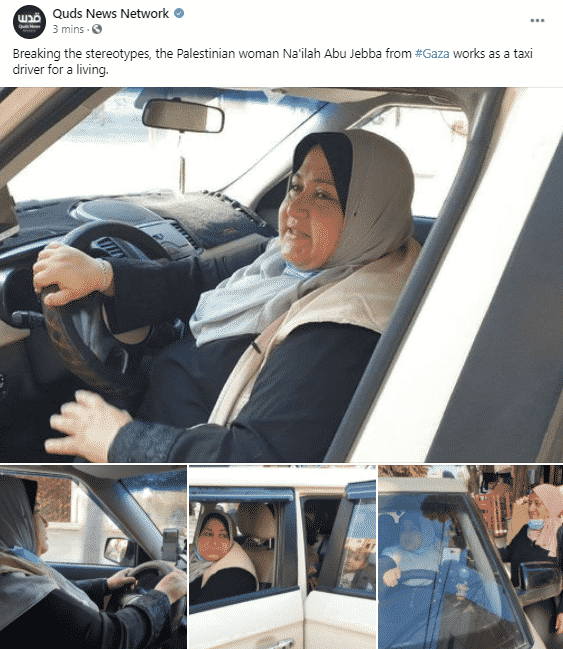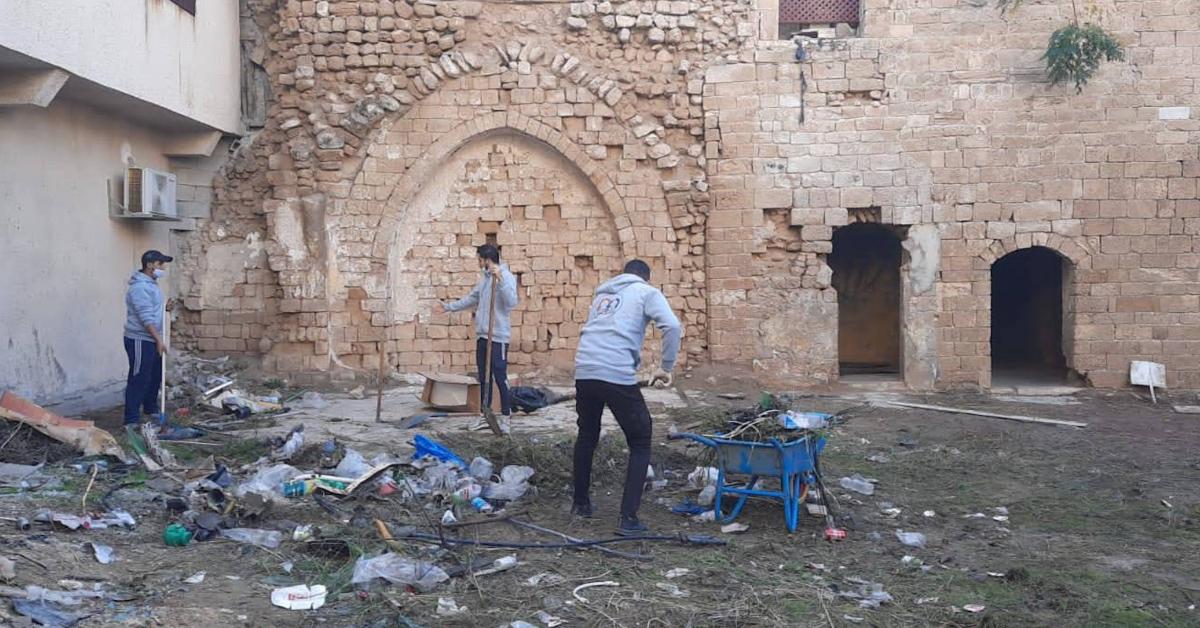800-year-old school in Gaza gets face-lift
The Gaza Ministry of Tourism and Antiquities, the Gaza municipality and the Iwan Center for Cultural Heritage in Gaza launched an initiative with activists to restore an old school in the old city of Gaza City, with the aim to preserve the enclave’s heritage and raise awareness about the importance of culture among Palestinians.
GAZA CITY, Gaza Strip — A group of young artists and activists in the Gaza Strip launched an initiative in early December in partnership with the Ministry of Tourism and Antiquities, the Gaza municipality and the
Iwan Center for Cultural Heritage in Gaza to rehabilitate
Kamalaia School in the old part of Gaza City.
The initiative dubbed “
Baytkom Amer” (roughly translated as “Your home will always be happy”) is part of the Culture, Arts and Community Participation project promoting the preservation of the cultural heritage of the old city, with a focus on enhancing community dialogue and raising awareness of the importance of culture, which is conducive to such a dialogue.
The project is funded by the
Abdul Mohsin al-Qattan Foundation and the
Swiss Agency for Development and Cooperation.
The initiative’s coordinator, Abdullah al-Razi, told Al-Monitor that Kamalaia School, which is located in the heart of the old city and was closed in the 1970s, is nearly 800 years old, dating back to the Mamluk era; it was built of ancient limestone on an area of 800 square meters (0.2 acres).
He explained that the school had been abandoned for a long time and turned into a dumpster for the neighborhood, while many parties were seeking to take advantage of the building and turn it into a residential or commercial compound given its vital location.
Razi said that the initiative comes within the framework of preserving the cultural heritage of the old city, which is rich in antiquities and historical landmarks, in a bid to
activate community dialogue, adopt a cultural heritage and strengthen community ties. He added that the initiative involves a group of artists and educated activists, as well as several volunteers from the area.
“Kamalaia School is considered part of the work on marginalized architectural heritage, as a national and a central issue, and part of individual and collective responsibility, aimed at enhancing awareness of the importance of heritage preservation in the old city,” he noted.
Razi added that the first stage of the initiative was cleaning the school’s yard, its rooms and corridors, in addition to some restoration works for three dilapidated classrooms and the outer walls in order to ensure the safety of the building and its future tenants. This first stage is almost complete and will be followed by the launching of cultural and art activities in the school building.
“We received $20,000 in funding, which is not enough to rehabilitate the entire school. This amount is dedicated to the restoration works and the activities,” Razi said.
He explained that the initiative’s activities include meetings, technical workshops, evening gatherings, exhibitions and field campaigns,
in a bid to increase awareness among the Palestinians of the cultural heritage and archaeological buildings in the Gaza Strip, and to involve them in the processes to preserve such landmarks.
Commenting on any difficulties in the project, Razi said that it was a two-fold challenge —
one related to problems with the ownership of the building and another related to community problems. “There are many people who are not aware of the importance of preserving places like this. We have a long way to go to achieve cultural, art and historical change, which can be done by the community through this initiative.”
Razi hopes that the project, which is set to last 10 months based on the received funding, will be sustainable after this period through sponsorship by local and international nongovernmental organizations.
Hussein Odeh, head of the public relations department in the Gaza municipality, told Al-Monitor that
there has been a dispute over the ownership of the school between the municipality, the Ministry of Tourism and Antiquities and the Ministry of Endowments. “This is not to mention that some residents also claim its ownership. These problems have led to the neglect of the school, which turned into a dumpster for the neighborhood. The initiative will play a role in bringing the different points of view together, as all parties advance the public interest through investment in favor of community service,” he said, alluding to the ownership problems that have yet to be resolved.
“A memorandum of understanding was signed with the municipality as part of the initiative, whereby we provided all necessary services such as cleaning, transferring waste, providing a water line and coordination with the electricity company to provide power to the school,” Odeh said. “The [initiative] team has a vision for recycling environmental waste, so we opened the municipality warehouses for them."
Jamal Abu Raida, director of the Antiquities and Heritage Department at the Ministry of Tourism and Antiquities in Gaza, told Al-Monitor that the initiative team signed a memorandum of understanding with the ministry to hold educational and art workshops and seminars at the school,
in a bid to raise awareness among citizens on the importance of antiquities as part of the cultural heritage of Palestinians.
“The ministry welcomes all community initiatives pertinent to the restoration of
historical monuments and relics, as long as this is done under the supervision of the ministry and does not affect the features of the landmarks,” he said.
Abu Raida noted that the
Israeli blockade on the Gaza Strip that has been in place since 2006 has negatively affected the restoration projects and the maintenance of archaeological sites in the coastal enclave, especially since these works require huge sums of money that the government cannot provide. He explained that the ministry relies on international funding for such projects.
“The government cannot allocate a budget estimated at millions of dollars for the restoration of archaeological sites, as this is not a priority for the time being in light of the dire financial conditions,” Abu Raida added.
Ahmad al-Astal, director of the Iwan Center, told Al-Monitor that the center carried out restoration works only for the hazardous parts in the school in order to safely receive visitors and hold events. He said that the initiative seeks to revive this old monument to eventually obtain the necessary funding to completely restore it, noting that a project to this effect is being prepared for presentation to international donors.
“Financing is the most challenging part of the initiative, as it is difficult to persuade donors given the Palestinian division.
This is not to mention the challenges in educating the community about the importance of preserving cultural heritage. We are working with the concerned and competent authorities to distribute instructions and regulations on the
protection of antiquities in Gaza,” he noted.
The Gaza Ministry of Tourism and Antiquities, the Gaza municipality and the Iwan Center for Cultural Heritage in Gaza launched an initiative with activists to restore an old school in the old city of Gaza City, with the aim to preserve the enclave’s heritage and raise awareness about the...

www.al-monitor.com
(Comment)
Do You notice?
a. They don't know what belongs to whom.
Whenever they see a Jew, they launch straight into -
"this belongs to me, my granny lived here since the dinosaurs...no doubt", but in reality they don't even know who owns what in Gaza,
and fight over it among themselves.
b. The gap between the propaganda image -
"historic palestine",
"indigenous palestinians",
and the reality of a people lacking the natural attachment, knowledge and value of respect and regard to the rich history and heritage of the land that they claim.



